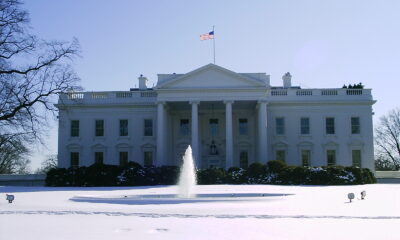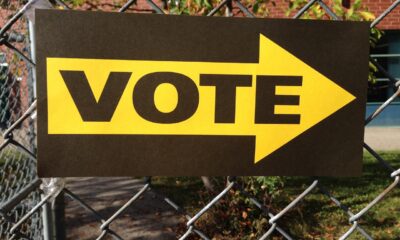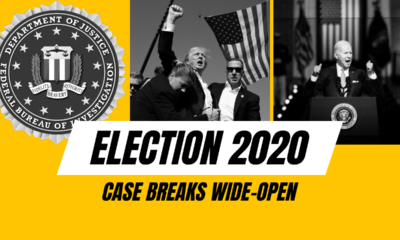Executive
Mobile voting precinct (election reform)

The Election of 2020 saw many irregularities, most of which Democrats say we cannot avoid. By “cannot” they mean “it wouldn’t be fair.” Most of the irregularities concerned absentee ballots – and absentee ballots have always been the bane of elections. Any discussion of absentee ballots comes down to the inevitable “hard cases” of people who just can’t show up at the polls on Election Day. Now CNAV knows as well as does any judge that bad cases make bad law. So we who want election reform to ensure election integrity, must address those “hard cases.” CNAV has found a way: the mobile voting precinct.
What is a mobile voting precinct?
A mobile voting precinct is literally a bus carrying staff, equipment and supplies to set up a voting precinct that can move to the people.
If the mountain will not come to Muhammad, then Muhammad must come to the mountain.
A mobile voting precinct could address nearly every case involving a voter living in the precinct but not able to vote in person on Election Day. For the hard cases that remain, in-person early voting would be acceptable, but for not more than one week. This essay will treat those who cannot spare a moment to vote in person at a central early voting precinct. Instead, the precinct would come to them.
And as a voting precinct, it would have all the official standing, authority and responsibility of a conventional voting precinct.
Staff and equipment
The staff would consist of the following positions. One person could hold more than one of these, but the mobile unit must have them all. They include:
- Driver and driver’s mate, who would have charge of the physical safety of all other staff on the road.
- Security officer, in charge of physical security at any stop.
- Sanitation officer, to sanitize equipment against, say, SARS-CoV-2.
- Chief Officer of Election (or Election Judge), who makes final decisions on balloting, provisional ballots, and so on.
- Assistant Chief Officer of Election (or Election Inspector): an Officer of Election from the opposite Party to the Chief.
- A number of Officers of Election sufficient to carry out the functions of a precinct.
All personnel for the mobile voting precinct would take an oath of office as Officers of Election.
The mobile voting precinct would be a vehicle large enough to carry all the staff and their equipment and supplies. The governing unit (county, parish, or independent city) need not buy a forty-seven-passenger bus. (Such a vehicle, in any case, would require Commercial Operator’s Licenses for driver and driver’s mate.) A much smaller bus, like a car rental parking lot shuttle, would serve easily.
The staff must carry all the equipment a conventional precinct would use. That includes a scanner-tabulator, a poll book, and a set of folding voting booths. A more sophisticated version might also carry its own folding tables and chairs.
Supplies
Obviously the mobile voting precinct would carry sheafs of paper ballots, provisional ballot packets, and lockboxes to hold paper ballots after scanning, completed provisional ballots, and spoiled ballots. (To spoil a ballot means to mark it “Void” when the voter makes a mistake or changes his mind.)The precinct must also carry black pens or soft pencils for ballot marking.
In addition, the Officers of Election should place signs marking the point beyond which they forbid all campaigning. And in case any voter needs solids or liquid refreshment, let the OOEs bring these things.
Finally, in this age of hypervigilance against infection, hand sanitizer becomes a necessary supply. The Sanitation Officer would apply disinfectant to the precinct’s equipment:
- Upon return to base, and
- Any time en route if a particularly nasty infecting event (like someone puking while in the voting booth) occurs.
Dispatching the mobile voting precinct
The mobile voting precinct would serve any institution or installation where one would expect to find many transportation-impaired voters in one place. The obvious candidates include:
- Long-term care homes. These go by names like “nursing home,” “assisted living community,” and the like.
- Hospitals. Hospital staff would have one of the priorities for in-person early voting. Hospital patients, however, can’t always plan such things ahead of time. The mobile voting precinct exists to serve them.
- In-patient physical medicine and rehabilitation centers. The same considerations apply.
In addition, a much smaller version (say, a crossover vehicle), perhaps with driver and driver’s mate (of opposite Parties), could visit a shut-in voter at home. A “mid-sized” version could visit any apartment complex where several voters need the mobile voting precinct to visit them. Voters would pre-apply for this service, instead of applying for mail-in absentee ballots as they do today.
How to vote at the mobile voting precinct
As mentioned, voters would pre-apply to have the mobile voting precinct come to them. When they did, all Poll Books would note that application in their records. The Poll Book for the mobile voting precinct would allow a pre-applied voter to use it. The Poll Book for the conventional precinct would not. Therefore any voter who, having applied for the mobile voting precinct, must either use it or vote a provisional ballot at his conventional precinct. Voting in-person and early would block regular voting at either kind of precinct.
When the mobile voting precinct arrives, its officers set up a precinct in any convenient room. (Or they could set up in a voter’s home or apartment.) They then follow the same procedure as for a regular precinct:
- Check the voter in,
- Issue him a ballot,
- Let him mark it in the privacy of a voting booth, and
- Turn it in for scanning.
The law forbids either Poll Book or scanner-tabulator to have Internet service. Therefore the quality of available Internet service is never at issue. Setup of the scanner-tabulator would take place before the vehicle even leaves its base.
Poll watchers and reporting
Accredited poll watchers would have two choices, depending on the type of dispatch. They could either:
- Meet the mobile voting precinct at its destination (typically the long-term care home, hospital, rehab, or apartment complex), or
- Ride around in it, especially if the registrar dispatches it to go door-to-door to voters’ single-family houses.
Today Chief Officers of Election report vote totals after closing. Chief Officers of Election for mobile voting precincts would do the same, and on the same channel: their personal cellphone. Poll watchers would of course stand by, with a copy of the scanner tape. (One other necessary reform might involve including the poll watcher on the reporting call, in conference-call mode.)
Objections
Corona Virus Disease (COVID-19, COVID, SARS-CoV-2) would not be an issue. The Sanitation Officer takes care of that. Sanitation has been part of the procedure at large venues for more than a year. Every staff member of the mobile voting precinct could receive slightly higher pay by reason of this and other hazards. (And a simple dietary and supplement regimen should allow an Officer of Election to carry out his duties without fear.)
Authentication is a persistent problem with mail-in ballots. The mobile voting precinct could handle authentication of ballots far better than can the central absentee precinct when processing absentee ballots.
More to the point, the mobile voting precinct could process its ballots at least as fast as could a conventional in-person precinct. Delays in official results tabulation and reporting need never occur again.
Here goes the last absentee ballot – and may the best man win!So says a shipwreck survivor after throwing a message-in-a-bottle into the sea, after his fellow survivors have done the same.
Military absentee ballots are another issue entirely. The mobile voting precinct exists to serve civilians.
And last: the budget for the mobile voting precinct would be far less than the budget for outgoing and incoming postage for mail-in ballots! To say nothing of the budget for the governing unit’s general counsel’s office, the District Attorney, and the Attorney General.
In sum
The mobile voting precinct is one instrument among many to obviate mail-in absentee ballots. It offers all the authentication and personal service of a conventional precinct, and more conveniently for voter and registrar alike.
Terry A. Hurlbut has been a student of politics, philosophy, and science for more than 35 years. He is a graduate of Yale College and has served as a physician-level laboratory administrator in a 250-bed community hospital. He also is a serious student of the Bible, is conversant in its two primary original languages, and has followed the creation-science movement closely since 1993.
-

 Executive5 days ago
Executive5 days agoWaste of the Day: Secret Settlements get Taxpayer Money
-

 Accountability2 days ago
Accountability2 days agoWaste of the Day: Principal Bought Lobster with School Funds
-

 Constitution1 day ago
Constitution1 day agoTrump, Canada, and the Constitutional Problem Beneath the Bridge
-

 Executive10 hours ago
Executive10 hours agoHow Relaxed COVID-Era Rules Fueled Minnesota’s Biggest Scam
-

 Civilization10 hours ago
Civilization10 hours agoThe End of Purple States and Competitive Districts
-

 Civilization4 days ago
Civilization4 days agoThe devil is in the details
-

 Executive3 days ago
Executive3 days agoTwo New Books Bash Covid Failures
-

 Executive3 days ago
Executive3 days agoThe Israeli Lesson Democrats Ignore at Their Peril













[…] that’s where your editor’s newest invention, the Mobile Voting Precinct, comes […]
[…] help placement agencies. But it might include refinements CNAV has suggested before, like the Mobile Voting Precinct. It also definitely includes getting rid of mail-in […]
[…] Any person who cannot vote in person may designate another person to vote on his or her behalf. But to do that, the voter must register himself (or herself) and his (or her) proxy in advance. What’s more, the voter must leave that form with the local police. A person may serve as a proxy for one voter living in France and maybe for an expatriate. (This eliminates the need for a Mobile Voting Precinct.) […]